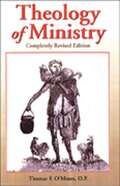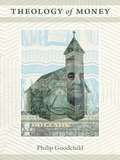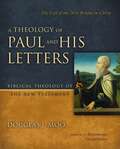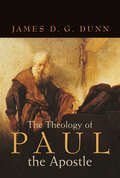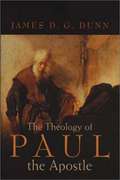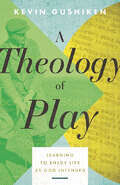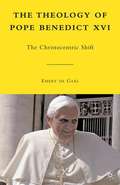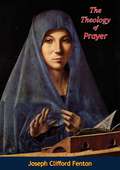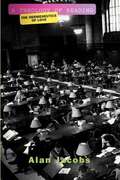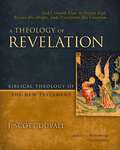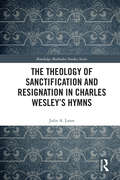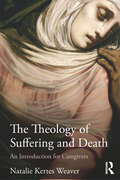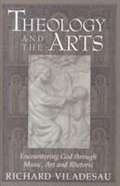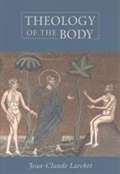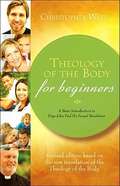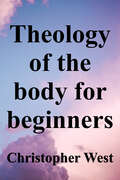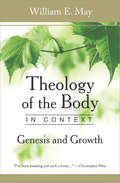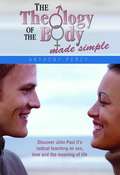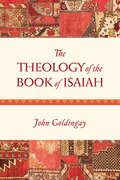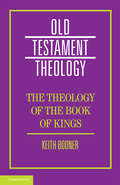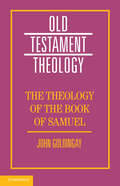- Table View
- List View
Theology of Ministry
by Thomas F. O'Meara"Parishes have since the 1960s fashioned a new model of parish: not that of pastor and assistants with sisters in the school but a model of circles of ministry around the pastor," states Thomas O'Meara. His Theology of Ministry, now revised and updated, brings readers up to date on this shift from biblical, historical, and theological perspectives. O'Meara presents a fundamental and cultural theology of ministry organized around the following subjects: <p>Ch. 1 The context of ministry <p>Ch. 2 The origins of ministry in the work of Jesus <p>Ch. 3 The metamorphoses of ministry through the centuries <p>Chs. 4-5 Ministry and ministers today<p> Chs. 6-7 Ideas on the sources and spirituality of ministry <p><p> Clearly written and packed with new material that makes it highly relevant for today's participants in ministry, both lay and clergy, this work is a must for seminaries, colleges, lay-ministry training centers, and diaconate training programs. Its broadly considered theology of ministry will make this a classic like its predecessor.
Theology of Money
by Philip GoodchildTheology of Money is a philosophical inquiry into the nature and role of money in the contemporary world. Philip Goodchild reveals the significance of money as a dynamic social force by arguing that under its influence, moral evaluation is subordinated to economic valuation, which is essentially abstract and anarchic. His rigorous inquiry opens into a complex analysis of political economy, encompassing markets and capital, banks and the state, class divisions, accounting practices, and the ecological crisis awaiting capitalism. Engaging with Christian theology and the thought of Carl Schmitt, Georg Simmel, Karl Marx, Adam Smith, and many others, Goodchild develops a theology of money based on four contentions, which he elaborates in depth. First, money has no intrinsic value; it is a promise of value, a crystallization of future hopes. Second, money is the supreme value in contemporary society. Third, the value of assets measured by money is always future-oriented, dependent on expectations about how much might be obtained for those assets at a later date. Since this value, when realized, will again depend on future expectations, the future is forever deferred. Financial value is essentially a degree of hope, expectation, trust, or credit. Fourth, money is created as debt, which involves a social obligation to work or make profits to repay the loan. As a system of debts, money imposes an immense and irresistible system of social control on individuals, corporations, and governments, each of whom are threatened by economic failure if they refuse their obligations to the money system. This system of debt has progressively tightened its hold on all sectors and regions of global society. With Theology of Money, Goodchild aims to make conscious our collective faith and its dire implications.
A Theology of Paul and His Letters: The Gift of the New Realm in Christ (Biblical Theology of the New Testament Series)
by Douglas J. MooA landmark study of the apostle's writings by one of the world's leading Pauline scholarsThis highly anticipated volume gives pastors, scholars, and all serious students of the New Testament exactly what they need for in-depth study and engagement with one of Christian history's most formative thinkers and writers. A Theology of Paul and His Letters is a landmark study of the apostle's writings by one of the world's leading Pauline scholars Douglas J. Moo. Fifteen years in the making, this groundbreaking work is organized into three major sections:Part 1 provides an overview of the issues involved in doing biblical theology in general and a Pauline theology in particular. Here Moo also sets out the methodological issues, formative influences, and conceptual categories of Paul's thought.Part 2 moves on to Paul's New Testament writings, where Moo describes each Pauline letter with particular relevance to its theology.Part 3 offers a masterful synthesis of Paul&’s theology under the overarching theme of the gift of the new realm in Christ.Engaging, insightful, and wise, this substantive, evangelical treatment of Paul's theology offers extensive engagement with the latest Pauline scholarship without sacrificing its readability. This volume brings insights from over thirty years of experience studying, teaching, and writing about Paul into one comprehensive guide that will serve readers as a go-to resource for decades to come.ABOUT THE SERIES: The Biblical Theology of the New Testament (BTNT) series provides upper college and seminary-level textbooks for students of New Testament theology, interpretation, and exegesis. Pastors and discerning theology readers alike will also benefit from this series. Written at the highest level of academic excellence by recognized experts in the field, the BTNT series not only offers a comprehensive exploration of the theology of every book of the New Testament, including introductory issues and major themes, but also shows how each book relates to the broad picture of New Testament Theology.
The Theology of Paul the Apostle
by James D. DunnIn this major work, James D. G. Dunn brings together more than two decades of vigorous and creative work on interpreting the letters of Paul into an integrated, full-scale study of Paul’s thought. Using Paul’s letter to the Romans as the foundation for constructing a fuller exposition of Paul’s whole theology, Dunn’s thematic treatment clearly describes Paul’s teaching on such topics as God, humankind, sin, christology, salvation, the church, and the Christian life. In the process Dunn engages in a concise way what other important scholars have said regarding each area of inquiry. The Theology of Paul the Apostle represents a major contribution to the ongoing discussion regarding what Paul’s theology is and what its continuing relevance is to the study and practice of religion and theology.
The Theology of Paul the Apostle
by James D. G. DunnUsing Paul's letter to the Romans as the foundation for his monumental study of Paul's theology, James D. G. Dunn describes Paul's teaching on God, sin, humankind, Christology, salvation, the church, and the nature of the Christian life.
The Theology of Paul's Letter to the Galatians
by James D. G. DunnPaul's Letter to the Galatians is one of the fiercest and most polemical writings in the Bible. That is what makes it, for the author of this study, such an exciting document to deal with. It emerges from the early days of a vigorous new movement (Christianity), when basic principles were first being formulated, and when the whole character of the movement was at stake. In the pages of Galatians we witness fundamental features of Christian theology taking shape before our eyes, where the living heart of Paul's gospel is encountered. For James D. G. Dunn there is an elemental quality about the letter, to which those tired of compromising half-truths are drawn when they feel the impulse to return to first principles. This book, which benefits from this perspective on Paul, explains more clearly than hitherto both the issues which confronted Paul and the powerful theological arguments he brought to bear in response, and casts light on a document still capable of shaping lives and theology today.
A Theology of Play: Learning to Enjoy Life as God Intended
by Kevin M. GushikenGod encourages you to experience great joy in following Jesus God has given humans freedom and permission to play--to fully enjoy life's moments as he intended, with no ulterior motive. The Christian life without play becomes malformed, and believers can miss aspects of the abundant life Jesus came to give. In A Theology of Play, Kevin Gushiken builds a case for getting serious about play as a vital element of being a Christian. "Play," he writes, "is not merely an activity but a way of living." Gushiken explores play from various biblical and theological lenses: How an identity grounded in God's good creation invites us to play The connection between play and the biblical concept of Sabbath Why past hurts don't have to keep us from enjoying the present Releasing false guilt and shame to find true freedom to Play How to play in the midst of difficulty and pain Ultimately, knowing and enjoying God brings freedom and pleasure. A Theology of Play helps Christian believers identify barriers to play in their day-to-day lives and offers faithful guidance in recapturing play within the rhythms of life.
The Theology of Pope Benedict XVI
by Emery De GaálMany refer to Pope Benedict XVI as "the Mozart of Theology. " Who are the thinkers who have informed his theology? What events, and which religious devotions, have shaped his personality? This study attempts to shed light on the unifying melody of the policies and positions of a pontificate charged with spiritual and theological depth.
The Theology of Prayer
by Joseph Clifford FentonThe Theology of Prayer, written by one of the twentieth century’s foremost theologians, distills the teachings of Thomas Aquinas, Thomas a Vallgornera, and Joseph a Spiritu Sancto, among other great scholastic theologians, on the nature of Christian prayer, whose writings hold such treasures on praying effectively that their loss would be a tragedy for the people of God.In these pages, Monsignor Fenton clearly and concisely presents to the contemporary reader the scholastics’ works and their insights on Sacred Scripture and Tradition. With The Theology of Prayer, Fenton revitalizes the work of those theologians, preserving their insights and presenting plainly what God has revealed about prayer and how the Church has preserved and expounded that revelation for the good and the salvation of all who believe. “Prayer is something, then, which is instituted, and which is commanded, for our benefit. It tends to make us love God more fully, hope in Him with greater confidence, and serve Him with greater devotion. (Joseph C. Fenton)
Theology of Reading: The Hermeneutics of Love
by Alan JacobsIf the whole of the Christian life is to be governed by the "law of love"-the twofold love of God and one's neighbor-what might it mean to read lovingly? That is the question that drives this unique book. Jacobs pursues this challenging task by alternating largely theoretical, theological chapters-drawing above all on Augustine and Mikhail Bakhtin-with interludes that investigate particular readers (some real, some fictional) in the act of reading. Among the authors considered are Shakespeare, Cervantes, Nabakov, Nicholson Baker, George Eliot, W. H. Auden, and Dickens. The theoretical framework is elaborated in the main chapters, while various counterfeits of or substitutes for genuinely charitable interpretation are considered in the interludes, which progressively close in on that rare creature, the loving reader. Through this doubled method of investigation, Jacobs tries to show how difficult it is to read charitably-even should one wish to, which, of course, few of us do. And precisely because the prospect of reading in such a manner is so offputting, one of the covert goals of the book is to make it seem both more plausible and more attractive.
A Theology of Revelation: God's Grand Plan to Defeat Evil, Rescue His People, and Transform His Creation (Biblical Theology of the New Testament Series)
by J. Scott DuvallA Theology of Revelation by J. Scott Duvall in Zondervan's Biblical Theology of the New Testament series provides a comprehensive look at the theology of John's Apocalypse. One of only a few dedicated theologies of Revelation, Duvall's book leaves no stone unturned in the study of the final book of the Christian canon of Scripture. This thoroughly researched study includes:an investigation into the historical framework of the book: authorship, date, and occasion and purpose;a survey of literary-theological foundations: genre, text and canonicity, grammar and symbolic language, use of the Old Testament, literary structure, and interpretation; anda full literary-theological reading of the book, culminating in an exploration of the book's most significant theological themes: God, Jesus Christ, the Holy Spirit, the people of God, worship, discipleship, salvation, God's judgment of evil, and the new creation.Readers will find here a study that is clearly written, attentive to the historical-literary context, with special attention given to the primary theological themes in the book. Perhaps above all, readers will have their hope in God and his amazing plan reinforced and strengthened.
The Theology of Sanctification and Resignation in Charles Wesley's Hymns (Routledge Methodist Studies Series)
by Julie A. LunnSanctification is a central theme in the theology of both John and Charles Wesley. However, while John’s theology of sanctification has received much scholarly attention, significantly less has been paid to Charles’ views on the subject. This book redresses this imbalance by using Charles’ many poetic texts as a window into his rich theological thought on sanctification, particularly uncovering the role of resignation in the development of his views on this key doctrine. In this analysis of Charles’ theology of sanctification, the centrality he accorded to resignation is uncovered to show a positive attribute involving acts of intention, desire and offering to God. The book begins by putting Charles’ position in the context of contemporary theology, and then shows how he differed in attitude from his brother John. It then discusses in depth how his hymns use the concept of resignation, both in relation to Jesus Christ and the believer. It concludes this analysis by identifying the ways in which Charles understood the relationship between resignation and sanctification; namely, that resignation is a lens through which Charles views holiness. The final chapter considers the implications of these conclusions for a twenty-first century theological and spiritual context, and asks whether resignation is still a concept which can be used today. This book breaks new ground in the understanding of Charles Wesley’s personal theology. As such, it will be of significant interest to scholars of Methodism and the Wesleys as well as those working in theology, spirituality, and the history of religion.
The Theology of Suffering and Death: An Introduction for Caregivers
by Natalie Kertes WeaverThis book offers a theological foundation for engaging with the realities of suffering and dying. Designed particularly for practical theology students and trainee caregivers, it introduces the spiritual and theological issues raised by suffering and dying. The chapters consider: how Christian theology deals with the problem of suffering and how the Bible treats these difficult issues post-biblical interpretations of Jesus’ suffering and the Cross modern instances including ecology, poverty, discrimination and war comparative religious approaches and the depiction in popular culture. Natalie Weaver relates theology to practical issues of caregiving and provides a ‘toolbox’ for thinking about suffering and death in a creative and supportive way.
Theology of the Arts: Encountering God through Music, Art and Rhetoric
by Richard ViladesauThis book explores, in a timely and engaging manner, several aspects of the relations between theology and aesthetics, in both the pastoral and academic realms. The underlying motif of this work is that beauty is a means of divine revelation, and that art is the human mediation that both enables and limits its revelatory power. Although aimed at undergraduate theology students, it will certainly capture the interest of art students, pastoral ministers and anyone who appreciates the arts.
Theology of the Body
by Jean-Claude LarchetLarchet traces the contours of this complex subject using Scripture and the Church Fathers. He situates the meaning and purpose of our bodies in the cosmic drama of salvation, without losing sight of the everyday activities that use and honor—or dishonor—the human body.
Theology of the Body for beginners: A Basic Introduction to Blessed John Paul II's Sexual Revolution
by Christopher WestBroken families, abortion, AIDS, Internet pornography, sexual abuse scandals, homosexual marriage, our Church and our world are in the midst of a profound sexual crisis. Is there a way out? For such a time as this have we been given Pope John Paul IIs Theology of the Body. Based on the words of Jesus, John Paul II's famous reflections on the body and sex take us to the root of the modern crisis and chart the path to an authentic sexual liberation. Yet the Pope's dense scholarship often intimidates the average person. In his book, Theology of the Body Explained, Christopher West offered a more detailed, six-hundred page commentary on John Paul II's Theology of the Body. Here, he provides a short and popular summary of the Pope's revolutionary teaching. What is the meaning of life? Why did God create us male and female? Why is there evil in the world and how do we overcome it? How do we attain true happiness on earth? What kind of joys await us in heaven? How can we experience the love we long for in the depth of our hearts? The first edition of Theology of the Body for Beginners (2004) quickly became an international best-seller. This freshly revised and expanded edition is based on Dr. Michael Waldsteins' much improved translation of John Paul IIs catechesis. New for this edition: All quotations have been updated with the new translation. Key insights discovered through Dr. Waldstein's access to the John Paul II archives have been incorporated. The outline of the text has been substantially reorganized to reflect the newly discovered outline of John Paul's original manuscript. John Paul's hidden and previously untranslated addresses are summarized.
Theology of the Body for Beginners: Rediscovering the Meaning of Life, Love, Sex, and Gender
by Christopher WestDivorce. Broken families. Sexual abuse. Addiction. Pornography. Same-sex "marriage." Gender issues. Everywhere we look, we find more and more confusion about the most fundamental truths of human life. As we lose our basic understanding of the meanings of man, woman, marriage, and sex, the question becomes ever more urgent: What does it mean to be a human being? Against this backdrop, St. John Paul II's Theology of the Body appears as a bright light in the darkness. His writings go straight to the heart of what it means to be fully human--but they are often difficult for most of us to grasp easily.
Theology of the Body For Teens: Discovering God's Plan for Love and Life,Middle School Edition
by Brian Butler Jason Evert Colin Maciver Aimee MaciverThis book is meant for teens and talks about life, love and emotions. It includes lesson objectives, exercises, answer key etc.
Theology of the Body in Context
by William E. MayThe zenith of John Paul II's thought on the human person, marriage, and the family is found in his "theology of the body." For the first time, William E. May provides a comprehensive yet readable overview of this work in the context of several other key writings of Karol Wojtyla/John Paul II, providing rich insights into the development of the theology of the body.
The Theology of the Body Made Simple
by Anthony PercyThis is a simple introduction to the basic premise of the theology of the body. It explains how our bodies are symbolic, free, meant for love, and redeemed by Christ. It presents unambiguous reasons for the Church's teaching on premarital sex, contraception, homosexuality, pornography, and more. And it gives reason to hope that the love we crave so deeply is, in fact, promised us by God...from the beginning.
The Theology of the Book of Amos
by John BartonIn modern times Amos has come to be considered one of the most important prophets, mainly for his uncompromising message about social justice. This book provides a detailed exploration of this theme and other important elements of the theology underlying the book of Amos. It also includes chapters on the text itself, providing a critical assessment of how the book came to be, the original message of Amos and his circle, which parts of the book may have been added by later scribes, and the finished form of the book. The author also considers the book's reception in ancient and modern times by interpreters as varied as rabbis, the Church Fathers, the Reformers, and liberation theologians. Throughout, the focus is on how to read the book of Amos holistically to understand the organic development of the prophet's message through the many stages of the book's development and interpretation.
The Theology of the Book of Isaiah: Diversity And Unity
by John GoldingayWhat should we make of the sprawling and puzzling book of Isaiah—so layered and complex in its composition? John Goldingay helps us see, hear and understand the grandeur of this prophetic masterpiece among the Prophets as both separate parts and as a whole, clearly tied together with unifying themes.
The Theology of the Book of Kings (Old Testament Theology)
by Keith Bodner1 and 2 Kings unfolds an epic narrative that concludes the long story of Israel's experience with institutional monarchy, a sequence of events that begins with the accession of Solomon and the establishment of the Jerusalem temple, moves through the partition into north and south, and leads inexorably toward the nation's destruction and the passage to exile in Babylon. Keith Bodner's The Theology of the Book of Kings provides a reading of the narrative attentive to its literary sophistication and theological subtleties, as the cast of characters - from the royal courts to the rural fields - are variously challenged to resist the tempting pathway of political and spiritual accommodations and instead maintain allegiance to their covenant with God. In dialogue with a range of contemporary interpreters, this study is a preliminary exploration of some theological questions that arise from the Kings narrative, while inviting contemporary communities of faith into deeper engagement with this enduring account of divine reliability amidst human scheming and rapaciousness.
The Theology of the Book of Revelation
by Richard BauckhamRichard Bauckham expounds the theology of the Book of Revelation: its understanding of God, Christ and the Spirit, the role of the Church in the world, and the hope of the coming of God's universal kingdom. Close attention is paid both to the literary form in which the theology is expressed and to the original context to which the book was addressed. Contrary to many misunderstandings of Revelation, it is shown to be one of the masterpieces of early Christian literature, with much to say to the Church today. This study offers a unique account of the theology and message of Revelation.
The Theology of the Book of Samuel (Old Testament Theology)
by John GoldingayThe Old Testament book of Samuel is an intriguing narrative that offers an account of the origin of the monarchy in Israel. It also deals at length with the fascinating stories of Saul and David. In this volume, John Goldingay works through the book, exploring the main theological ideas as they emerge in the narratives about Samuel, Saul, and David, as well as in the stories of characters such as Hannah, Michal, Bathsheba, and Tamar. Goldingay brings out the key ideas about God and God's involvement in the lives of people, and their involvement with him through prayer and worship. He also delves into the mystery and complexity of human persons and their roles in events. Goldingay's study traces how God pursues his purpose for Israel and, ultimately, for the world in these narratives. It shows how this pursuit is interwoven with the realities of family, monarchy, war, love, ambition, loss, failure, and politics.
